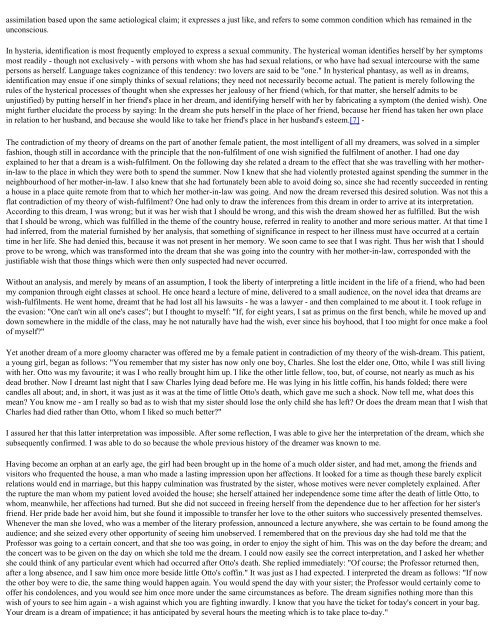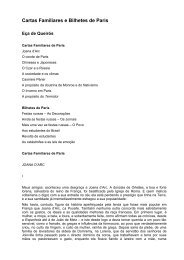The Interpretation of Dreams Sigmund Freud (1900)
The Interpretation of Dreams Sigmund Freud (1900)
The Interpretation of Dreams Sigmund Freud (1900)
You also want an ePaper? Increase the reach of your titles
YUMPU automatically turns print PDFs into web optimized ePapers that Google loves.
assimilation based upon the same aetiological claim; it expresses a just like, and refers to some common condition which has remained in the<br />
unconscious.<br />
In hysteria, identification is most frequently employed to express a sexual community. <strong>The</strong> hysterical woman identifies herself by her symptoms<br />
most readily - though not exclusively - with persons with whom she has had sexual relations, or who have had sexual intercourse with the same<br />
persons as herself. Language takes cognizance <strong>of</strong> this tendency: two lovers are said to be "one." In hysterical phantasy, as well as in dreams,<br />
identification may ensue if one simply thinks <strong>of</strong> sexual relations; they need not necessarily become actual. <strong>The</strong> patient is merely following the<br />
rules <strong>of</strong> the hysterical processes <strong>of</strong> thought when she expresses her jealousy <strong>of</strong> her friend (which, for that matter, she herself admits to be<br />
unjustified) by putting herself in her friend's place in her dream, and identifying herself with her by fabricating a symptom (the denied wish). One<br />
might further elucidate the process by saying: In the dream she puts herself in the place <strong>of</strong> her friend, because her friend has taken her own place<br />
in relation to her husband, and because she would like to take her friend's place in her husband's esteem.[7] -<br />
<strong>The</strong> contradiction <strong>of</strong> my theory <strong>of</strong> dreams on the part <strong>of</strong> another female patient, the most intelligent <strong>of</strong> all my dreamers, was solved in a simpler<br />
fashion, though still in accordance with the principle that the non-fulfilment <strong>of</strong> one wish signified the fulfilment <strong>of</strong> another. I had one day<br />
explained to her that a dream is a wish-fulfilment. On the following day she related a dream to the effect that she was travelling with her motherin-law<br />
to the place in which they were both to spend the summer. Now I knew that she had violently protested against spending the summer in the<br />
neighbourhood <strong>of</strong> her mother-in-law. I also knew that she had fortunately been able to avoid doing so, since she had recently succeeded in renting<br />
a house in a place quite remote from that to which her mother-in-law was going. And now the dream reversed this desired solution. Was not this a<br />
flat contradiction <strong>of</strong> my theory <strong>of</strong> wish-fulfilment? One had only to draw the inferences from this dream in order to arrive at its interpretation.<br />
According to this dream, I was wrong; but it was her wish that I should be wrong, and this wish the dream showed her as fulfilled. But the wish<br />
that I should be wrong, which was fulfilled in the theme <strong>of</strong> the country house, referred in reality to another and more serious matter. At that time I<br />
had inferred, from the material furnished by her analysis, that something <strong>of</strong> significance in respect to her illness must have occurred at a certain<br />
time in her life. She had denied this, because it was not present in her memory. We soon came to see that I was right. Thus her wish that I should<br />
prove to be wrong, which was transformed into the dream that she was going into the country with her mother-in-law, corresponded with the<br />
justifiable wish that those things which were then only suspected had never occurred.<br />
Without an analysis, and merely by means <strong>of</strong> an assumption, I took the liberty <strong>of</strong> interpreting a little incident in the life <strong>of</strong> a friend, who had been<br />
my companion through eight classes at school. He once heard a lecture <strong>of</strong> mine, delivered to a small audience, on the novel idea that dreams are<br />
wish-fulfilments. He went home, dreamt that he had lost all his lawsuits - he was a lawyer - and then complained to me about it. I took refuge in<br />
the evasion: "One can't win all one's cases"; but I thought to myself: "If, for eight years, I sat as primus on the first bench, while he moved up and<br />
down somewhere in the middle <strong>of</strong> the class, may he not naturally have had the wish, ever since his boyhood, that I too might for once make a fool<br />
<strong>of</strong> myself?"<br />
Yet another dream <strong>of</strong> a more gloomy character was <strong>of</strong>fered me by a female patient in contradiction <strong>of</strong> my theory <strong>of</strong> the wish-dream. This patient,<br />
a young girl, began as follows: "You remember that my sister has now only one boy, Charles. She lost the elder one, Otto, while I was still living<br />
with her. Otto was my favourite; it was I who really brought him up. I like the other little fellow, too, but, <strong>of</strong> course, not nearly as much as his<br />
dead brother. Now I dreamt last night that I saw Charles lying dead before me. He was lying in his little c<strong>of</strong>fin, his hands folded; there were<br />
candles all about; and, in short, it was just as it was at the time <strong>of</strong> little Otto's death, which gave me such a shock. Now tell me, what does this<br />
mean? You know me - am I really so bad as to wish that my sister should lose the only child she has left? Or does the dream mean that I wish that<br />
Charles had died rather than Otto, whom I liked so much better?"<br />
I assured her that this latter interpretation was impossible. After some reflection, I was able to give her the interpretation <strong>of</strong> the dream, which she<br />
subsequently confirmed. I was able to do so because the whole previous history <strong>of</strong> the dreamer was known to me.<br />
Having become an orphan at an early age, the girl had been brought up in the home <strong>of</strong> a much older sister, and had met, among the friends and<br />
visitors who frequented the house, a man who made a lasting impression upon her affections. It looked for a time as though these barely explicit<br />
relations would end in marriage, but this happy culmination was frustrated by the sister, whose motives were never completely explained. After<br />
the rupture the man whom my patient loved avoided the house; she herself attained her independence some time after the death <strong>of</strong> little Otto, to<br />
whom, meanwhile, her affections had turned. But she did not succeed in freeing herself from the dependence due to her affection for her sister's<br />
friend. Her pride bade her avoid him, but she found it impossible to transfer her love to the other suitors who successively presented themselves.<br />
Whenever the man she loved, who was a member <strong>of</strong> the literary pr<strong>of</strong>ession, announced a lecture anywhere, she was certain to be found among the<br />
audience; and she seized every other opportunity <strong>of</strong> seeing him unobserved. I remembered that on the previous day she had told me that the<br />
Pr<strong>of</strong>essor was going to a certain concert, and that she too was going, in order to enjoy the sight <strong>of</strong> him. This was on the day before the dream; and<br />
the concert was to be given on the day on which she told me the dream. I could now easily see the correct interpretation, and I asked her whether<br />
she could think <strong>of</strong> any particular event which had occurred after Otto's death. She replied immediately: "Of course; the Pr<strong>of</strong>essor returned then,<br />
after a long absence, and I saw him once more beside little Otto's c<strong>of</strong>fin." It was just as I had expected. I interpreted the dream as follows: "If now<br />
the other boy were to die, the same thing would happen again. You would spend the day with your sister; the Pr<strong>of</strong>essor would certainly come to<br />
<strong>of</strong>fer his condolences, and you would see him once more under the same circumstances as before. <strong>The</strong> dream signifies nothing more than this<br />
wish <strong>of</strong> yours to see him again - a wish against which you are fighting inwardly. I know that you have the ticket for today's concert in your bag.<br />
Your dream is a dream <strong>of</strong> impatience; it has anticipated by several hours the meeting which is to take place to-day."









